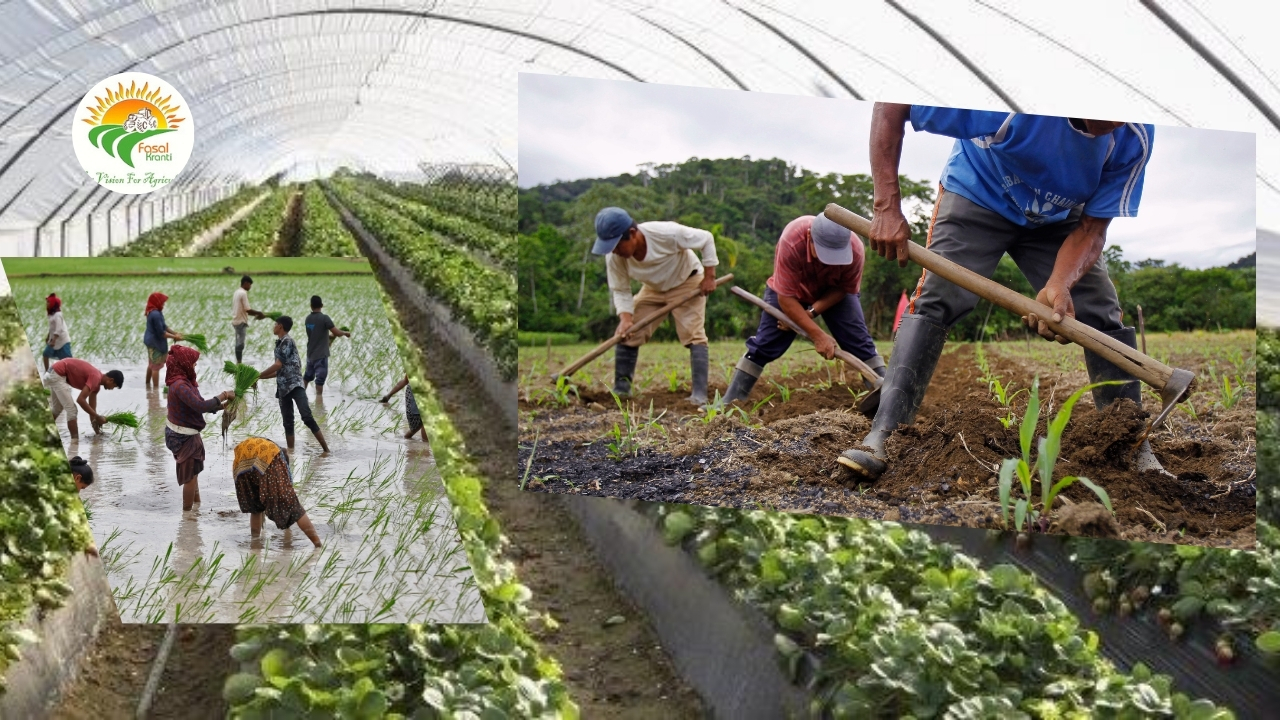Agricultural Cooperative: Unity Boosts Farmer Income & Growth
Agricultural cooperatives are powerful tools that help farmers grow together, earn more, and reduce risks. In today’s farming world, small and medium farmers often struggle with high agrochemical costs, limited access to quality seeds, modern equipment, and fair markets. This is where agricultural cooperative make a big difference. By joining a cooperative, farmers pool their resources, buy inputs like fertilizers and seeds in bulk, access greenhouse farming tools, and sell crops at better prices through collective bargaining. These cooperatives also provide training, storage facilities, and financial support, helping farmers increase productivity and income. Across India especially in states like Haryana agricultural cooperatives are improving rural livelihoods and empowering farmers to become self-reliant. Whether you’re a new farmer or experienced grower, understanding the role of an agricultural cooperative can help you take smarter steps toward a profitable and sustainable future in farming. Let’s explore how co-ops create real change in agriculture.
What are Agricultural cooperative?
An agricultural cooperative is a group or team of farmers who come together to help each other. They work as one family to buy seeds, fertilizers, and machines at lower prices, sell crops at better rates, and share knowledge, tools, and support. It is the most common type of farmer group in the world because it helps small and medium farmers grow stronger together. These co-ops are made by farmers, for farmers not for private profit. In short, an agricultural cooperative service means farmers join hands to make farming easier, cheaper, and more profitable for everyone.
Two primary types of cooperative:
A. Supply cooperative:
A supply cooperative is a farmer group that buys seeds, fertilizers, and agrochemicals in bulk to provide quality inputs at low prices, helping farmers save costs and boost productivity.
B. Marketing cooperative:
A marketing cooperative is a farmer-owned group that helps members sells their crops collectively to get better prices, reduce middlemen, and access bigger markets. By working together, farmers gain stronger bargaining power, fair payments, and improved income from their produce.
Benefits of Agricultural cooperative?
- Lower Input Costs Bulk purchase of seeds, fertilizers, and agrochemicals at discounted rates.
- Better Market Access Collective selling helps farmers get fair prices and reduce dependency on middlemen.
- Access to Modern Equipment Shared use of tractors, tools, and greenhouse farming technology.
- Storage and Transport Support Co-ops provide go downs and transport to reduce post-harvest losses.
- Financial Assistance Easier access to loans, credit, and subsidies through cooperative banks.
- Training and Education Regular workshops on modern farming practices and techniques.
- Fair Profit Sharing Earnings are distributed equally based on participation, not land size.
- Stronger Bargaining Power United voice increases negotiation strength in buying and selling.
- Risk Reduction Shared resources and knowledge reduce financial and crop failure risks.
- Empowerment of Small Farmers Enhances income, confidence, and self-reliance in rural communities.
Importance of farm cooperative:
Farm cooperatives play a vital role in transforming the lives of small and marginal farmers. These farmer-owned organizations are built on the idea of working together to reduce farming costs and improve income. By joining a cooperative, farmers can purchase essential inputs like seeds, fertilizers, and agrochemicals at lower prices through bulk buying. They also gain access to shared farm machinery, including tractors and greenhouse equipment, which boosts productivity and makes farming more efficient. This collective approach helps make modern farming tools and practices more affordable and accessible, especially for those with limited resources.
Beyond cost-saving, one of the biggest strengths of farm cooperatives is collective marketing. Selling crops together gives farmers greater bargaining power and helps them earn better prices by cutting out middlemen. Cooperatives also offer essential services such as storage, transport, training, credit, farming equipment, and crop insurance. They encourage democratic decision-making, knowledge sharing, and unity among farmers. In states like Haryana, agricultural cooperatives have strengthened rural economies and empowered farming communities. By reducing risk and increasing opportunity, farm cooperatives create a path toward sustainable, profitable, and self-reliant agriculture ensuring farmers can grow more and earn more together.
How do you work agricultural cooperative?
An agricultural cooperative is a farmer-owned group that helps reduce costs, boost income, and improve farm operations. By working together, farmers buy inputs like seeds, fertilizers, and agrochemicals in bulk at lower prices and share tools, tractors, and storage. Co-ops also market produce collectively, ensuring better prices and cutting out middlemen. They offer credit, crop insurance, and training, especially benefiting small farmers. Agricultural cooperatives promote unity, sustainability, and rural growth.
How do agricultural cooperative help individual farmers?
Agricultural cooperatives play a crucial role in supporting individual farmers, especially small and marginal ones who often face challenges like high input costs, limited market access, and lack of financial support. By joining a cooperative, individual farmers become part of a collective system that works for their benefit helping them grow more efficiently and earn better incomes.
- Lower Input Costs
Co-ops buy seeds, fertilizers, and agrochemicals in bulk, offering them to farmers at reduced rates. - Access to Shared Resources
Farmers can use cooperative-owned tractors, irrigation systems, and greenhouse equipment they couldn’t afford alone. - Collective Crop Marketing
Selling together helps farmers avoid middlemen and secure better prices for their produce. - Improved Post-Harvest Handling
Co-ops provide storage, transport, and grading services, reducing crop losses and enhancing quality. - Financial Support
Cooperatives offer credit, crop insurance, and help connect farmers with government schemes. - Training and Technical Assistance
Co-ops organize training sessions and provide expert advice on modern, sustainable farming techniques. - Empowerment and Unity
Farmers have a voice in cooperative decisions, promoting collective strength and self-reliance. - Increased Profitability
Overall, cooperatives help reduce risks, cut costs, and boost farm income for individual members.
Role of agricultural cooperatives in rural development?
Agricultural cooperatives play a transformative role in rural development by empowering farmers, enhancing livelihoods, and strengthening local economies. These farmer owned institutions serve as powerful platforms for collective action, enabling rural communities to access affordable inputs like seeds, fertilizers, and agrochemicals through bulk purchasing. By lowering production costs, cooperatives make farming more profitable, especially for small and marginal farmers who often struggle with limited resources. They also provide access to shared machinery, storage facilities, and modern tools like greenhouse farming systems, which increase productivity and efficiency. Importantly, cooperatives eliminate middlemen by facilitating collective marketing, allowing farmers to secure better prices for their produce and ensuring a fair share of profits. Beyond economic gains, agricultural cooperatives contribute to rural development through financial services such as credit, crop insurance, and support with government schemes. They also offer education, training, and technical assistance, helping farmers adopt sustainable and advanced agricultural practices. Cooperatives promote inclusive participation and democratic decision-making, giving every member regardless of landholding a voice in shaping their future. This collective spirit fosters unity, builds trust, and encourages local leadership. As cooperatives improve farm incomes, they create employment opportunities, reduce rural migration, and contribute to food security. In regions like Haryana, cooperatives have revitalized entire villages by turning agriculture into a stable, profitable profession. Overall, agricultural cooperatives are more than just farm support groups they are engines of rural progress that uplift entire communities, drive economic growth, and pave the way for a more resilient and self-reliant rural India.
Challenges of agricultural cooperative?
Agricultural cooperatives offer many benefits, but they also face several challenges that can limit their success and impact. These include:
Lack of Professional Management
Many cooperatives are run without skilled leadership or proper training, leading to poor decisions and weak performance.
Political Interference
External political pressure often disrupts fair functioning and hampers independent decision-making within cooperatives.
Limited Farmer Awareness
Many farmers are unaware of how cooperatives work or how to benefit from them, resulting in low participation and impact.
Financial Constraints
Inadequate funds limit a cooperative’s ability to invest in storage, marketing, technology, and member services.
Corruption and Misuse of Funds
Poor transparency and dishonest practices reduce trust among members and weaken the cooperative’s effectiveness.
Final Thoughts:
Agricultural cooperative are game-changers for small and medium farmers, helping them reduce costs, access quality inputs, and boost income through collective power. By pooling resources, buying in bulk, and marketing together, farmers gain better prices and productivity. Co-ops also provide essential support like training, storage, and finance. In states like Haryana, they are transforming rural livelihoods and empowering farmers to build a more sustainable and profitable future.
FAQS
- What is an agricultural cooperative?
An agricultural cooperative is a group of farmers who join together to buy seeds, fertilizers, and farming equipment at lower prices and sell their crops at better rates. By working as a team, they reduce costs, avoid middlemen, and earn more. These co-ops are made by farmers, for farmers not for private profit.
- What are the benefits of joining an agricultural cooperative?
- Lower input costs through bulk buying
- Access to modern tools like tractors and greenhouse farming equipment
- Better crop prices through collective selling
- Support services like storage, transport, and credit
- Training and unity that empower small farmers
- How do agricultural cooperatives help small farmers?
Co-ops help small and marginal farmers by:
- Making inputs affordable
- Giving access to shared machines and tools
- Helping them sell crops at fair prices
- Providing loans, insurance, and government support
- Offering training to improve productivity and income
- Why are cooperatives important for rural development?
Agricultural cooperatives uplift rural areas by:
- Creating jobs and reducing migration
- Strengthening local economies
- Building self-reliance among farmers
- Promoting modern, sustainable farming
- Uniting farmers for collective progress
- What challenges do agricultural cooperatives face?
Co-ops also face problems like:
- Lack of trained leadership
- Political interference
- Low farmer awareness
- Shortage of funds
- Misuse of money or poor management
Solving these can make cooperatives even more powerful for farmers.






